What Do Elderberries Taste Like? Find Out Nature’s Berry Secret
Elderberries, those mysterious dark purple clusters hanging from wild shrubs, have intrigued food enthusiasts and health-conscious individuals for generations.
Small, unassuming berries pack a powerful punch of flavor and potential wellness benefits that spark curiosity among many.
Nature's little dark gems are not your typical sweet summer fruit, presenting a complex taste profile that might surprise unsuspecting palates.
Their unique characteristics make them stand out in the world of edible berries, drawing attention from culinary experts and home cooks alike.
Foragers and wild food lovers appreciate elderberries for their distinctive qualities that set them apart from more common berry varieties.
Understanding the nuanced flavor of elderberries requires more than a casual glance or quick taste test.
Dive into this article to unravel the delicious secrets behind these remarkable berries and learn why they have captured the imagination of food lovers everywhere.
Elderberries: What to Know
Sambucus trees grow berries that many people know as elderberries.
Black elder or Sambucus nigra stands out as the most common tree in this group.
Cooks and health lovers should know these berries need careful preparation.
Raw elderberries can make someone sick, causing problems like stomach pain, throwing up, and feeling terrible.
Small white or cream flowers grow in delicate clusters on these trees.
Dark blue or black elderberry bunches hang beside these soft blossoms.
Native American healers and European plant experts have used elderberries for centuries.
Medical researchers believe these berries help strengthen body defenses against winter sicknesses like colds and flu.
Health support comes from special compounds hidden inside these small dark fruits.
Elderberry Flavor Guide
Elderberries taste similar to grapes.
Berries come with a jelly-like texture and small seeds inside.
Seeds give these berries their tart and earthy flavor.
Salads and other dishes benefit from their unique taste.
Health advantages make elderberries even more special.
These small fruits help with kidney problems, might lower cancer risks, and reduce stress.
Cooking methods work best for elderberries.
Raw consumption is not recommended.
Heating helps create a tangy and sweet flavor profile.
Wine and liqueur makers often use elderberries for extra taste.
Cooking enhances the berry's natural tartness.
Salads, desserts, and recipes welcome this interesting ingredient.
Elderberries carry a sour and herbal taste.
Eating them raw can be dangerous.
Cooking removes potential toxins and makes them safe.
Syrup remains a popular way to enjoy these berries.
Sugar helps balance their intense flavor.
Mixing elderberries with sugar creates a delightful drink.
Healthy and tasty combinations emerge from careful preparation.
Grape-like characteristics define elderberry texture.
Berries feel slightly chewy with smooth surfaces.
Small edible seeds add complexity to their taste.
Sour notes dominate without sweetness.
These berries complement other berry types nicely.
Vitamin and mineral content makes them nutritionally valuable.
Different from grapes or blackberries, elderberries offer a unique experience.
Elderberry: Health Benefits
Elderberry contains special compounds called anthocyanins that support health in powerful ways.
These natural substances work hard to fight damage from harmful molecules that can hurt cell structures.
Natural defense mechanisms inside elderberry help block viruses and reduce symptoms of common illnesses.
Compounds in this berry calm inflammation and help balance how your body responds to threats.
Colds And Flu Relief
Elderberry juice syrup works as an old-school home remedy targeting viruses that spark colds and flu.
Medical experts suggest this syrup might reduce the strength and length of certain infections, with some research studies providing limited support.
Research shows travelers consuming Elderberry extract during a 15-day window around their journey experienced half as many sick days compared to those skipping the supplement.
Studies tracking upper respiratory tract symptoms revealed travelers using Elderberry encountered milder cold experiences.
However, scientific data indicates Elderberry does not decrease cold infection risks.
Infection rates remained almost equal between groups taking Elderberry and those receiving placebos.
Helps Lessen Pain
Anthocyanins help lower body swelling.
Elderberry extract stops immune cells from making nitric oxide.
Injuries and certain health problems trigger nitric oxide as a signal for inflammation.
Blocking this chemical response can help decrease pain and reduce swelling.
Stops Diseases From Starting
Elderberry carries special healing qualities according to some natural health professionals.
These experts suggest elderberries might help reduce risks connected to serious health problems like cancer and heart conditions.
Current medical research shows potential health benefits from eating foods packed with antioxidants, but scientific studies have not definitively proven elderberry directly prevents these specific illnesses.
Ways to Use Elderberries
Picked up some elderberries from local markets or your garden?
Sweet success!
After carefully washing these dark blue-black fruits, separate them from their stems.
Sliding a fork through clusters makes this task simple and quick.
Wondering about elderberry uses?
Plenty of delicious options await:
Elderberry Jam
Elderberry jam makes a tasty spread that works wonderfully by itself or mixed with other fruit.
Blending these tart berries with sweeter choices like apples or pears creates a balanced and delightful mixture.
Elderberry Juice
Grandma's top cold remedy shines through her special elderberry drink.
Winter walks can leave you feeling chilly, and her warm elderberry juice provides perfect comfort.
When straight elderberry feels too strong, she knows just how to soften its taste.
Small additions of other fruits make the juice more pleasant.
Mix in red or black fruits like redcurrants, cherries, or blackberries to create a balanced and soothing beverage.
These extra fruits help smooth out the elderberry's intense flavor while keeping all its healthy benefits.
Warm sips of this fruity mixture will chase away winter's cold and bring warmth to your body.
Elderberry Muffins
Blueberry and currant muffins spark joy, and elderberry muffins offer an equally delightful experience.
Blackberries create magic when mixed with honey, turning cake batter into a rich purple treat.
Wondering how to handle these delicious berries?
Did you pick fresh elderberries from local markets or gather them yourself?
Excitement builds as baking preparations begin!
Start by carefully washing the berries and gently separating blue-black fruits from their stems.
Can Elderberries Be Used as Medicine?
Elderberry offers several health perks beyond typical remedies.
One writer shared an amazing story about elderberry syrup helping her small child bounce back from sickness!
Scientific studies suggest black elderberry might strengthen immune responses, fight viral infections like influenza, and potentially reduce body inflammation.
While major medical research remains limited, many individuals report positive health experiences with elderberry.
WebMD highlights additional potential advantages such as boosting immune function for HIV/AIDS patients, reducing sinus discomfort, easing nerve pain like sciatica, and addressing chronic fatigue syndrome.
Elderberry Possible Side Effects
Elderberry supplements help health, but raw elderberry fruit, bark, or leaves can cause stomach problems.
Undigested raw berries mean extract supplements from raw plant materials are unsafe.
Elderberry syrup, candies, and juice come from processed berries that remove dangerous chemicals, making them safe to eat.
Key negative reactions from consuming raw elderberry plant parts include:
Ripe, cooked elderberry fruit is safe when eaten in small amounts.
Eating too many elderberries might lead to diarrhea, stomach pain, and belly cramps.
Medicinal elderberry use requires only ripe or dried berries.

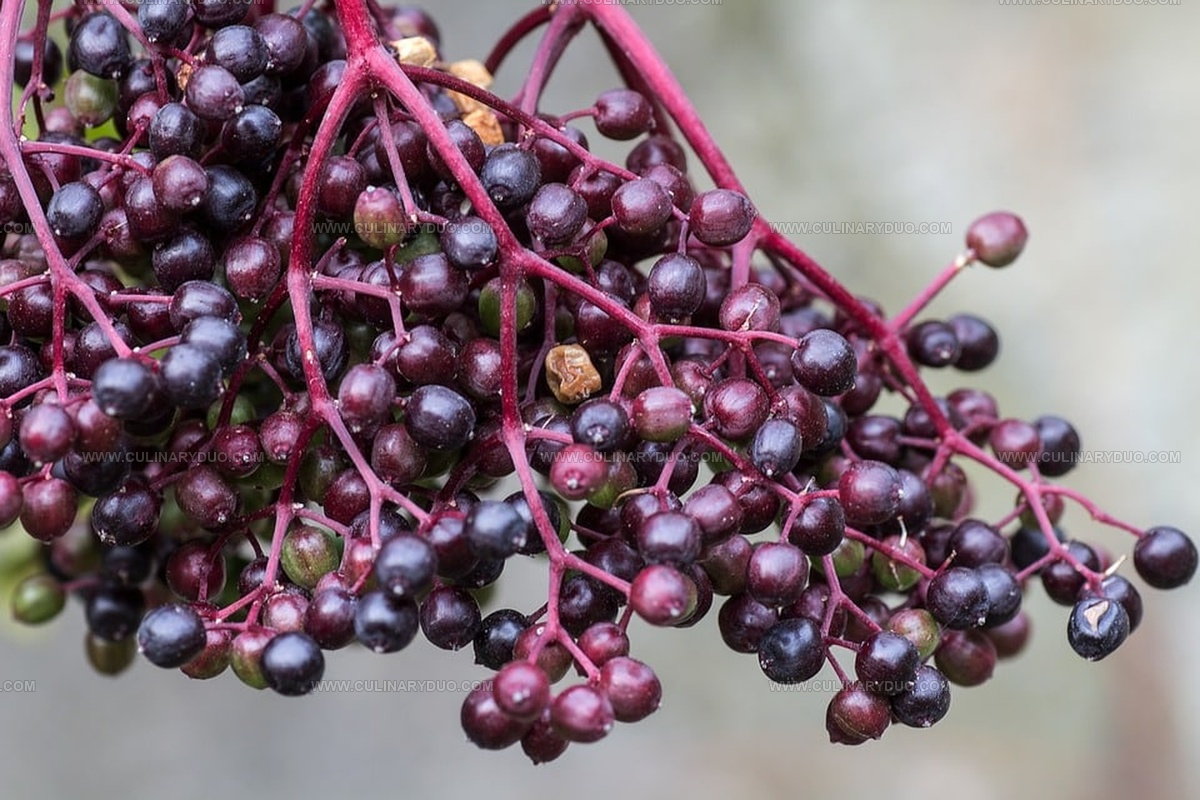
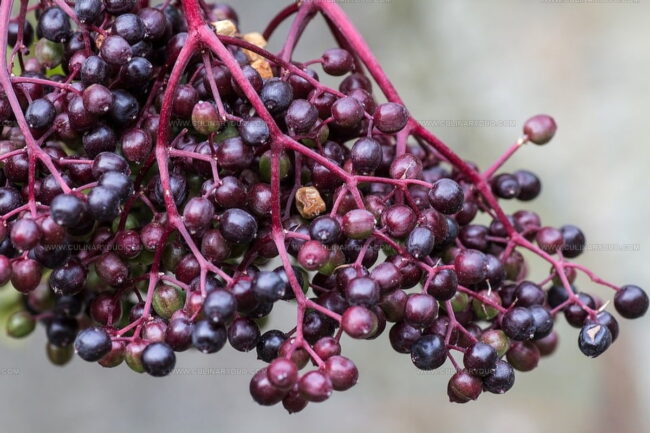
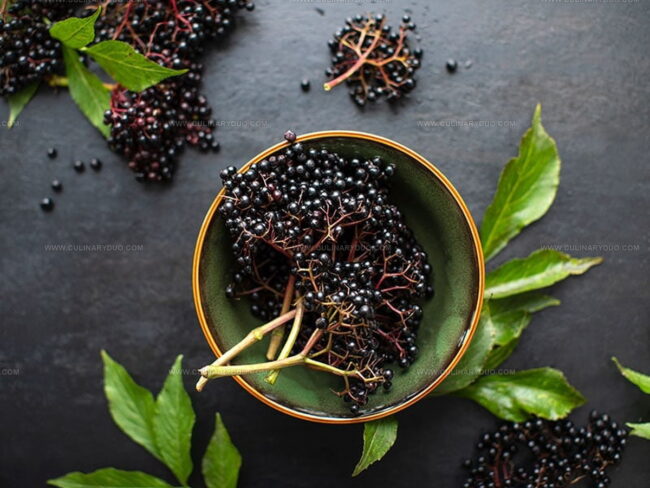
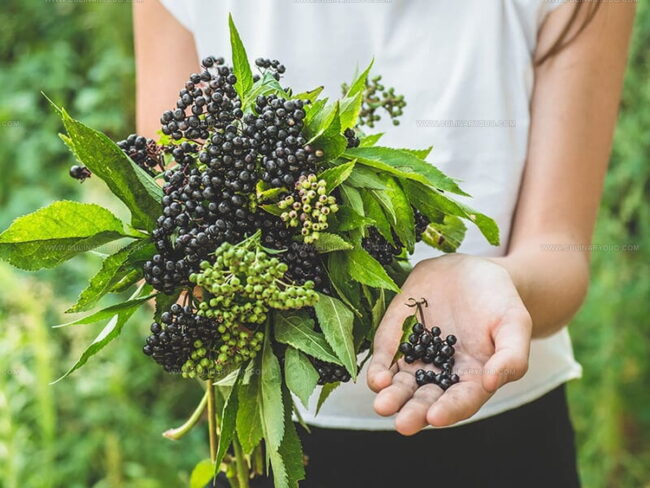
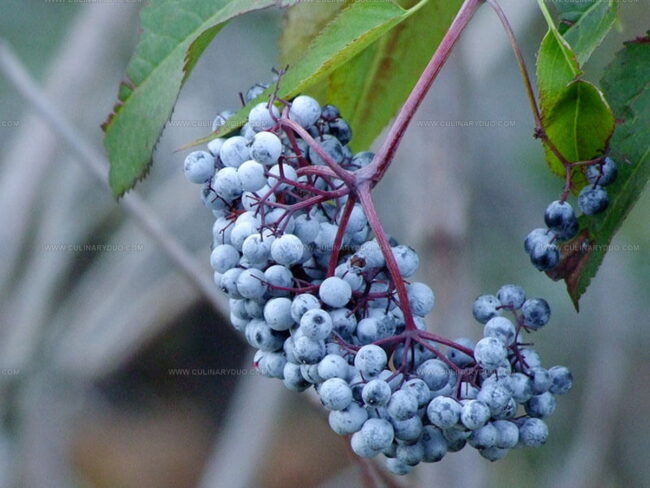
Natalie Brooks
Co-Founder & Content Strategist
Expertise
Education
eCornell
Natalie brings the vibrant, plant-powered side to Culinary Duo. After earning her Plant-Based Nutrition Certificate from eCornell, she combined her love for fresh ingredients with a passion for storytelling, aiming to make healthy cooking simple and satisfying.
Her kitchen motto: good food doesn’t need a fancy label, it just needs fresh ideas and a little creativity. Outside of writing and recipe testing, Natalie’s happiest in her garden, exploring farmers’ markets, or mixing global flavors into new kitchen experiments.